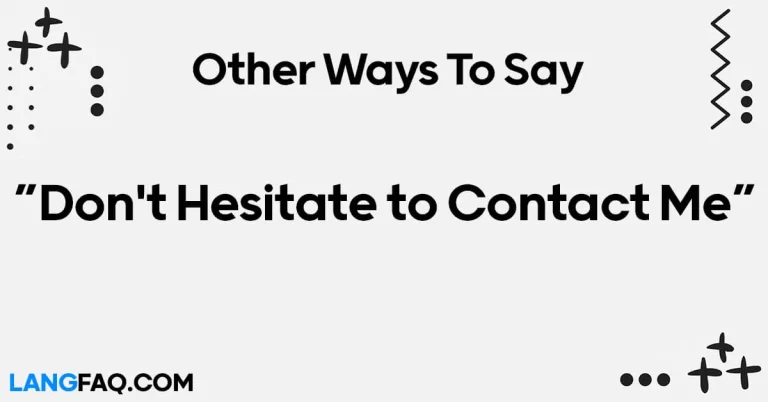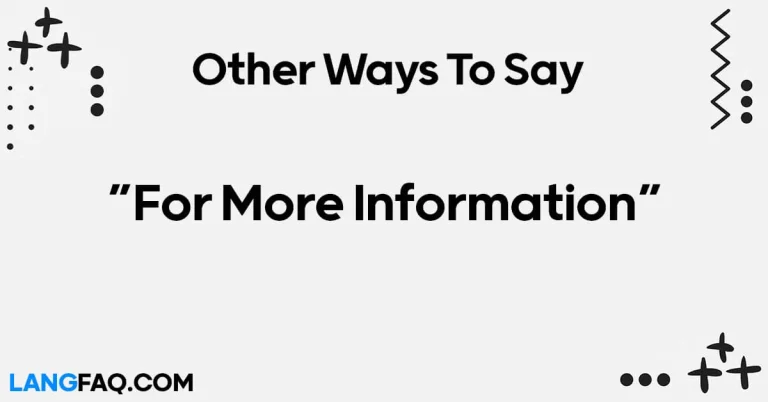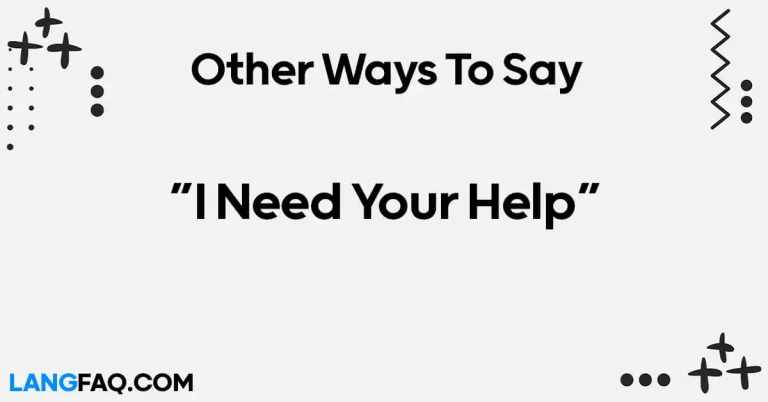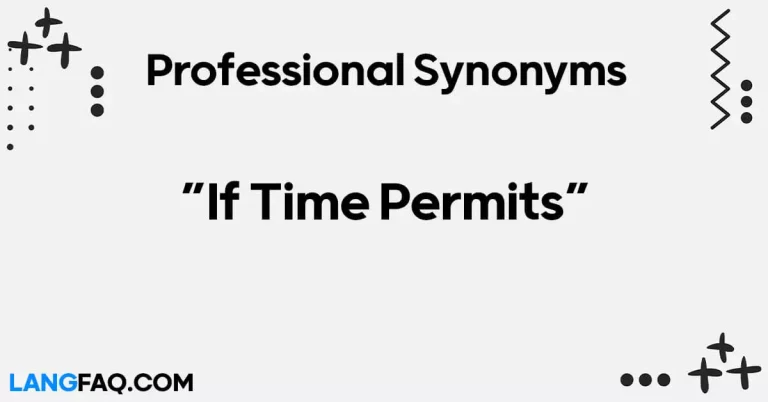In the realm of communication, diversity and creativity are key. Overusing phrases like “Just to Let You Know” can make your speech mundane and less engaging. Fear not! We’ve curated a list of 12 dynamic alternatives to rejuvenate your language and captivate your audience. Let’s explore these vibrant alternatives together.
12 Other Ways to Say “Just to Let You Know”
Here are 12 alternative ways to say “Just to Let You Know”:
- I thought I’d inform you.
- Wanted to give you a heads up.
- It’s important that you’re aware.
- Just a friendly reminder.
- I felt it necessary to let you know.
- Thought you should be informed.
- I wanted to bring this to your attention.
- I need to tell you something.
- It’s crucial for you to know.
- I wanted to keep you updated.
- I felt obliged to inform you.
- I thought you should know about this.
| Phrase | Meaning | Example |
|---|---|---|
| I thought I’d inform you. | Expressing intention to share information. | “I thought I’d inform you that the meeting has been rescheduled.” |
| Wanted to give you a heads up. | Informing someone in advance. | “Wanted to give you a heads up about the traffic jam.” |
| It’s important that you’re aware. | Stressing the significance of being informed. | “It’s important that you’re aware of the safety regulations.” |
| Just a friendly reminder. | Politely prompting someone’s memory. | “Just a friendly reminder to submit your report by Friday.” |
| I felt it necessary to let you know. | Expressing the importance of sharing information. | “I felt it necessary to let you know about the changes in schedule.” |
| Thought you should be informed. | Implying the need for someone to know something. | “Thought you should be informed about the upcoming event.” |
| I wanted to bring this to your attention. | Drawing someone’s focus to a specific matter. | “I wanted to bring this to your attention: the deadline is approaching.” |
| I need to tell you something. | Expressing urgency to communicate. | “I need to tell you something important about the project.” |
| It’s crucial for you to know. | Emphasizing the importance of information. | “It’s crucial for you to know the new company policies.” |
| I wanted to keep you updated. | Expressing the desire to provide ongoing information. | “I wanted to keep you updated on the latest developments.” |
| I felt obliged to inform you. | Feeling compelled to share information. | “I felt obliged to inform you about the budget cuts.” |
| I thought you should know about this. | Suggesting the importance of someone being aware. | “I thought you should know about the upcoming changes in management.” |
These alternative phrases offer diverse ways to communicate the need for sharing information effectively. Whether it’s about providing updates, reminders, or urgent notifications, incorporating these variations enriches communication and ensures clarity in conveying messages.
Is It Correct to Say “Just to Let You Know”?
Yes, “Just to let you know” is a common and grammatically correct phrase used to inform someone about something. It is often used to preface a piece of information or to provide a gentle heads-up without sounding too formal or assertive.
This phrase is commonly used in both spoken and written communication, such as in emails, text messages, or casual conversations. It serves as a polite way to share information, offer updates, or provide reminders without coming across as abrupt or demanding.
Here are a few examples of how “Just to let you know” can be used:
- “Just to let you know, the meeting has been rescheduled to tomorrow afternoon.”
- “Just to let you know, I’ll be out of the office next week on vacation.”
- “Just to let you know, there’s a sale happening at the store this weekend.”
- “Just to let you know, I’ve forwarded your request to the appropriate department for review.”
Overall, “Just to let you know” is a versatile and polite phrase that effectively conveys information in various contexts.
Professional Mail Example With “Just to Let You Know”
Subject: Update on Project Timeline
Dear [Recipient’s Name],
Just to let you know, there have been some adjustments to the timeline for our upcoming project. After careful review and consideration, we’ve decided to extend the deadline by one week to ensure that we deliver the highest quality results.
We understand that this change may impact your schedule and workload, and we appreciate your flexibility and understanding during this time. Rest assured, we are committed to maintaining open communication and providing support to ensure the success of the project.
If you have any questions or concerns about the revised timeline, please don’t hesitate to reach out to me directly. Your input and feedback are valuable as we continue to move forward with this project.
Thank you for your attention to this matter, and I look forward to your continued collaboration.
Best regards, [Your Name]
I thought I’d inform you.
When you want to convey information in a straightforward yet considerate manner, “I thought I’d inform you” is a great choice. This phrase shows that you are taking the initiative to share something important or relevant with the recipient.
Scenario: Imagine you’re working on a group project with colleagues, and you’ve discovered a new development that affects everyone’s tasks. Using “I thought I’d inform you” allows you to smoothly introduce the information without sounding abrupt.
Example Sentence: “I thought I’d inform you that the deadline for the project has been extended by two days.”
Variations:
- For a more casual setting among friends: “Hey, I thought I’d inform you about the party this weekend.”
- In a mentor-mentee relationship: “As your mentor, I thought I’d inform you about this valuable networking opportunity.”
Email Sample:
Subject: Update on Project Deadline
Hi Team,
I thought I’d inform you that the deadline for the project has been extended by two days. Please adjust your timelines accordingly.
Best, [Your Name]
Insight: According to Cambridge Dictionary, the phrase “I thought I’d inform you” is an idiomatic expression used to introduce information or news in a polite and considerate manner.
Wanted to give you a heads up.
When you want to provide someone with advance notice or a warning about something, “Wanted to give you a heads up” is a friendly and informal way to do so.
Scenario: Imagine you’re planning a surprise birthday party for a friend, but you know they have a busy schedule. Using “Wanted to give you a heads up” allows you to give them a heads up about the upcoming event without ruining the surprise.
Example Sentence: “Wanted to give you a heads up that we’re planning a surprise party for Sarah next weekend.”
Variations:
- In a professional setting: “Just wanted to give you a heads up about the upcoming changes in our department.”
- Between friends: “Hey, wanted to give you a heads up that tickets for the concert are selling out fast.”
Email Sample:
Subject: Heads Up – Schedule Change
Hi Team,
Wanted to give you a heads up that there’s been a change in the meeting schedule. The weekly status meeting will now be held on Fridays instead of Thursdays.
Thanks, [Your Name]
Insight: The phrase “heads up” originated from sports, where players alert each other by saying “heads up” to watch out for incoming objects or dangers.
It’s important that you’re aware.
When emphasizing the significance of someone being informed or knowledgeable about a particular matter, “It’s important that you’re aware” conveys a sense of urgency and importance.
Scenario: Imagine you’re discussing safety protocols with your family before a hiking trip. Using “It’s important that you’re aware” underscores the seriousness of the information you’re about to share.
Example Sentence: “It’s important that you’re aware of the potential risks involved in hiking in this area.”
Variations:
- In a professional context: “It’s important that you’re aware of the company’s policies regarding data security.”
- Between friends discussing current events: “It’s important that you’re aware of what’s happening in the world around us.”
Email Sample:
Subject: Important Information – Safety Guidelines
Hi Everyone,
It’s important that you’re aware of the safety guidelines for our upcoming hiking trip. Please take a moment to review the attached document before we depart.
Thanks, [Your Name]
Insight: The phrase “It’s important that you’re aware” emphasizes the necessity of being informed or knowledgeable about a particular subject or situation for one’s well-being or success.
Just a friendly reminder.
When you need to gently prompt someone’s memory or draw attention to a task or event, “Just a friendly reminder” is a polite and considerate way to do so without sounding demanding.
Scenario: Imagine you’re organizing a team event, and you need everyone to RSVP by a certain date. Using “Just a friendly reminder” in your email serves as a gentle nudge to ensure everyone responds on time.
Example Sentence: “Just a friendly reminder to RSVP for the team dinner by Friday.”
Variations:
- In a professional setting: “Just a friendly reminder to submit your expense reports by the end of the month.”
- Between friends planning a trip: “Just a friendly reminder to pack your sunscreen for our beach vacation.”
Email Sample:
Subject: Friendly Reminder – RSVP for Team Dinner
Hi Team,
Just a friendly reminder to RSVP for the team dinner by Friday. We need to confirm the final headcount with the restaurant.
Thanks, [Your Name]
Insight: The phrase “Just a friendly reminder” is commonly used in written communication to gently prompt someone’s memory or draw attention to a task or event without being overly formal or demanding.
I felt it necessary to let you know.
When you want to express the importance or urgency of sharing information, “I felt it necessary to let you know” conveys a sense of responsibility and sincerity in communicating important details.
Scenario: Imagine you’re working on a project with a tight deadline, and you discover a critical error in the data. Using “I felt it necessary to let you know” in your email to your supervisor demonstrates your commitment to transparency and problem-solving.
Example Sentence: “I felt it necessary to let you know about the error in the data that may impact our project timeline.”
Variations:
- In a mentor-mentee relationship: “I felt it necessary to let you know about this learning opportunity.”
- Between friends discussing personal matters: “I felt it necessary to let you know about my decision to move.”
Email Sample:
Subject: Important Update – Data Error
Hi [Supervisor’s Name],
I felt it necessary to let you know about an error I discovered in the data analysis that may impact our project timeline. Please let me know the best course of action to address this issue promptly.
Thank you, [Your Name]
Insight: The phrase “I felt it necessary to let you know” indicates a personal judgment or assessment that sharing the information is essential or important for the recipient’s awareness or decision-making.
Thought you should be informed.
When you want to convey information while acknowledging the recipient’s need to know, “Thought you should be informed” is a respectful and considerate way to share updates or news.
Scenario: Imagine you’re part of a volunteer group organizing a charity event, and there’s a change in the venue. Using “Thought you should be informed” in your group chat ensures that everyone is aware of the update without feeling left out.
Example Sentence: “Thought you should be informed that the venue for the charity event has been changed to the community center.”
Variations:
- In a professional context: “Thought you should be informed about the upcoming changes in our project timeline.”
- Between friends discussing weekend plans: “Thought you should be informed that the movie screening has been postponed.”
Email Sample:
Subject: Important Update – Charity Event Venue Change
Hi Team,
Thought you should be informed that we’ve changed the venue for the charity event to the community center. Please spread the word to ensure everyone is aware of the update.
Thanks, [Your Name]
Insight: The phrase “Thought you should be informed” implies that the speaker has considered the recipient’s need to know and is sharing the information for their benefit or awareness. It’s a polite and considerate way to communicate updates or news.
I wanted to bring this to your attention.
When you need to draw someone’s focus to a specific matter or issue, “I wanted to bring this to your attention” is a professional and effective way to highlight important information without being overly assertive.
Scenario: Imagine you’re in a meeting discussing potential budget cuts, and you notice a discrepancy in the financial report. Using “I wanted to bring this to your attention” allows you to raise the issue diplomatically and ensure it gets addressed.
Example Sentence: “I wanted to bring this to your attention: there seems to be a discrepancy in the financial report that needs to be addressed.”
Variations:
- In a mentor-mentee relationship: “I wanted to bring this to your attention as a learning opportunity.”
- Between colleagues discussing a project: “I wanted to bring this to your attention before we finalize the budget proposal.”
Email Sample:
Subject: Attention Needed – Financial Report Discrepancy
Hi [Recipient’s Name],
I wanted to bring this to your attention: there appears to be a discrepancy in the financial report for [specific project]. Could you please review and address this matter at your earliest convenience?
Thank you, [Your Name]
Insight: The phrase “I wanted to bring this to your attention” is a polite and formal way to highlight a specific matter or issue, often used in professional or business communication to ensure important information is noticed and addressed.
I need to tell you something.
When you need to convey a message that requires immediate attention or has significant importance, “I need to tell you something” is a direct and assertive way to capture the recipient’s focus.
Scenario: Imagine you’re in a serious conversation with a friend, and you need to share sensitive information about a mutual acquaintance. Using “I need to tell you something” sets the tone for the conversation and indicates the gravity of the information being shared.
Example Sentence: “I need to tell you something about Sarah’s health condition. It’s important that you know.”
Variations:
- In a professional context: “I need to tell you something about the upcoming changes in our company’s policies.”
- Between friends discussing personal matters: “I need to tell you something about my decision to move to a new city.”
Email Sample:
Subject: Important Information – Urgent
Hi [Recipient’s Name],
I need to tell you something urgent regarding our upcoming project. Please let me know when you have a moment to discuss.
Thanks, [Your Name]
Insight: The phrase “I need to tell you something” is straightforward and assertive, indicating that the speaker has information to share that requires the recipient’s immediate attention or consideration. It’s commonly used in both formal and informal settings to initiate important conversations or convey urgent messages.
It’s crucial for you to know.
When you want to stress the importance of someone being informed about a particular matter, “It’s crucial for you to know” emphasizes the significance of the information being conveyed.
Scenario: Imagine you’re discussing safety protocols with a new employee, and you need to ensure they understand the procedures thoroughly. Using “It’s crucial for you to know” underscores the importance of their awareness for their own safety and the safety of others.
Example Sentence: “It’s crucial for you to know the emergency evacuation procedures in case of fire.”
Variations:
- In a professional context: “It’s crucial for you to know the compliance regulations for our industry.”
- Between friends discussing travel plans: “It’s crucial for you to know the entry requirements for the country you’re visiting.”
Email Sample:
Subject: Important Information – Safety Protocols
Hi [Recipient’s Name],
It’s crucial for you to know the safety protocols we have in place for our workplace. Please review the attached document for details and feel free to reach out if you have any questions.
Best, [Your Name]
Insight: The phrase “It’s crucial for you to know” emphasizes the importance or necessity of someone being informed about a particular matter, often used to highlight critical information or procedures that are essential for their well-being, success, or understanding.
I wanted to keep you updated.
When you want to provide someone with the latest information or developments on a particular topic, “I wanted to keep you updated” is a courteous and proactive way to ensure they stay informed.
Scenario: Imagine you’re collaborating on a project with a team member, and there have been recent changes to the project timeline. Using “I wanted to keep you updated” in your email lets them know that you’re proactive in sharing information and keeping everyone in the loop.
Example Sentence: “I wanted to keep you updated on the progress of the project and let you know about the recent changes to the timeline.”
Variations:
- In a professional context: “I wanted to keep you updated on the status of the client’s account and share the latest updates.”
- Between friends planning a trip: “I wanted to keep you updated on our travel itinerary and any changes to the schedule.”
Email Sample:
Subject: Project Update – Revised Timeline
Hi [Team Member’s Name],
I wanted to keep you updated on the progress of the project and share the latest developments. Please review the attached document for the revised timeline and let me know if you have any questions or concerns.
Thanks, [Your Name]
Insight: The phrase “I wanted to keep you updated” demonstrates a proactive approach to communication, indicating the speaker’s intention to ensure the recipient stays informed about relevant information or developments. It’s commonly used in both professional and informal settings to maintain open communication and transparency.
I felt obliged to inform you.
When you want to convey a sense of responsibility or duty in sharing information with someone, “I felt obliged to inform you” communicates your commitment to keeping them informed and involved.
Scenario: Imagine you’re a team leader and you’ve received feedback from a client about a project. Using “I felt obliged to inform you” in your discussion with your team members shows that you take their feedback seriously and are committed to addressing any concerns promptly.
Example Sentence: “I felt obliged to inform you about the feedback we received from the client regarding the recent project delivery.”
Variations:
- In a mentor-mentee relationship: “As your mentor, I felt obliged to inform you about this learning opportunity.”
- Between friends discussing personal matters: “I felt obliged to inform you about the situation with our mutual friend.”
Email Sample:
Subject: Client Feedback – Action Required
Hi Team,
I felt obliged to inform you about the feedback we received from the client regarding the recent project delivery. Please review the details and let’s discuss how we can address their concerns and improve moving forward.
Thanks, [Your Name]
Insight: The phrase “I felt obliged to inform you” conveys a sense of duty or responsibility in sharing information with someone, often used to emphasize the importance or seriousness of the matter being communicated. It indicates the speaker’s commitment to transparency and accountability in communication.
I thought you should know about this.
When you want to share information with someone because you believe it’s important for them to be aware of it, “I thought you should know about this” expresses your consideration for their well-being or interest in keeping them informed.
Scenario: Imagine you’re discussing upcoming travel plans with a friend, and you’ve come across some useful tips for packing. Using “I thought you should know about this” allows you to share helpful information without assuming they already know.
Example Sentence: “I thought you should know about this packing hack that can save you a lot of space in your suitcase.”
Variations:
- In a professional context: “I thought you should know about this opportunity for professional development.”
- Between friends discussing a mutual interest: “I thought you should know about this new restaurant that just opened in our neighborhood.”
Email Sample:
Subject: Travel Tips – Packing Hack
Hi [Friend’s Name],
I thought you should know about this packing hack I came across that can save you a lot of space in your suitcase. Let me know if you want me to share more details!
Cheers, [Your Name]
Insight: The phrase “I thought you should know about this” demonstrates the speaker’s consideration for the recipient’s well-being or interest in sharing information that they believe is relevant or important. It’s often used to convey helpful tips, useful advice, or important updates in both formal and informal communication settings.
FAQs
Q: Are these alternatives suitable for both formal and informal communication? A: Yes, these alternatives can be tailored to suit various communication contexts, whether formal or informal.
Q: Can I use these phrases in written correspondence as well? A: Absolutely! These alternatives are versatile and can be used in emails, letters, or any written communication.
Q: Will using these alternatives improve my communication skills? A: Yes, incorporating diverse phrases into your vocabulary enhances your communication skills and makes your speech more engaging.
Q: How can I remember to use these alternatives in conversation? A: Practice incorporating these phrases into your daily speech and soon they’ll become second nature to you.
Q: Can I mix and match these alternatives for different situations? A: Certainly! Feel free to experiment with different alternatives to suit the tone and context of your communication.
Q: Will using these alternatives make me sound more professional? A: Using varied and expressive language demonstrates your proficiency and versatility in communication, which can enhance your professional image.
Conclusion
Communication is an art, and mastering it requires creativity and adaptability. By embracing alternatives to “Just to Let You Know,” you enrich your language and foster more engaging conversations. So why settle for mundane phrases when you can infuse your speech with vitality and expression? Explore these alternatives today and elevate your communication to new heights!







